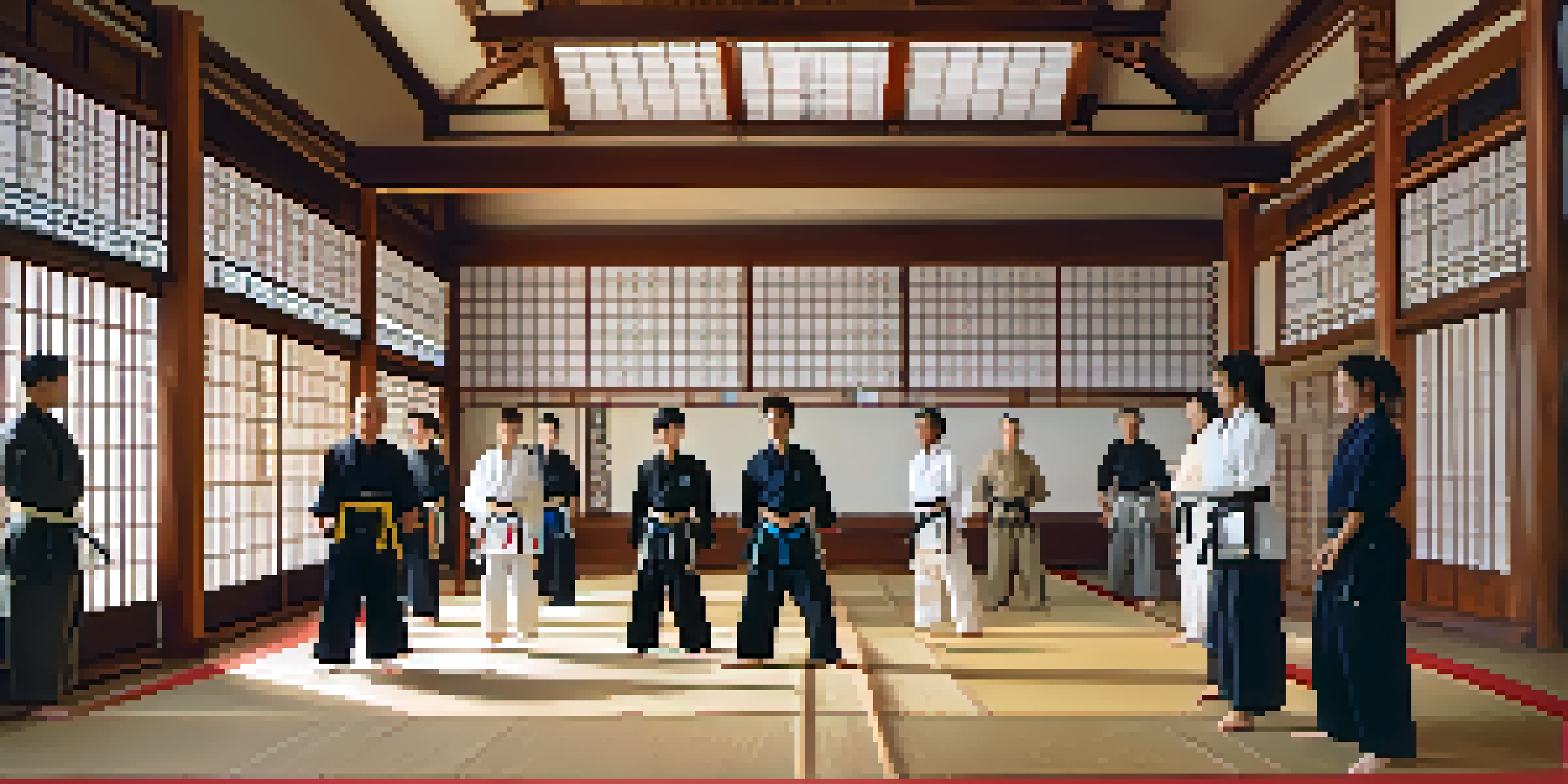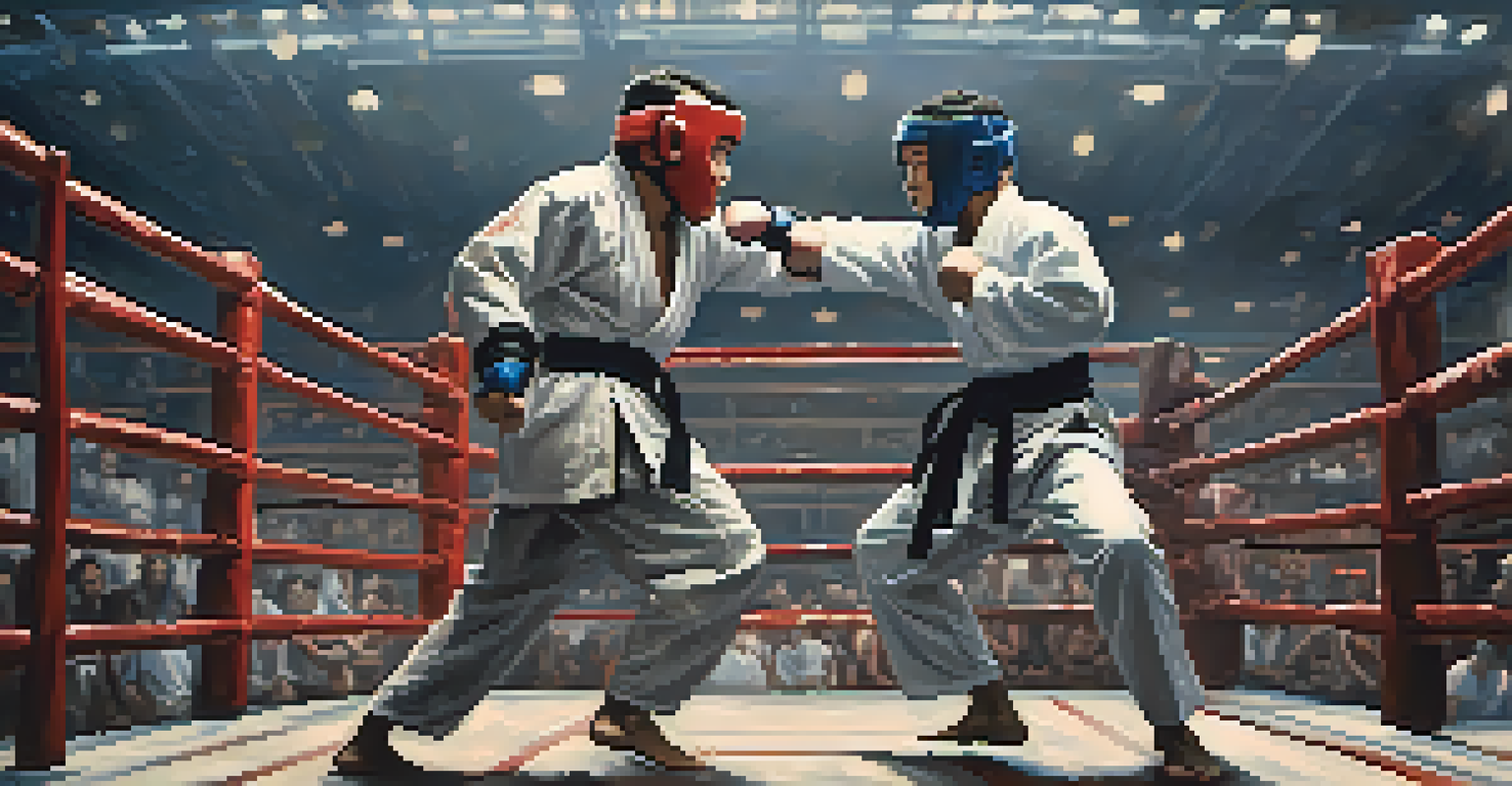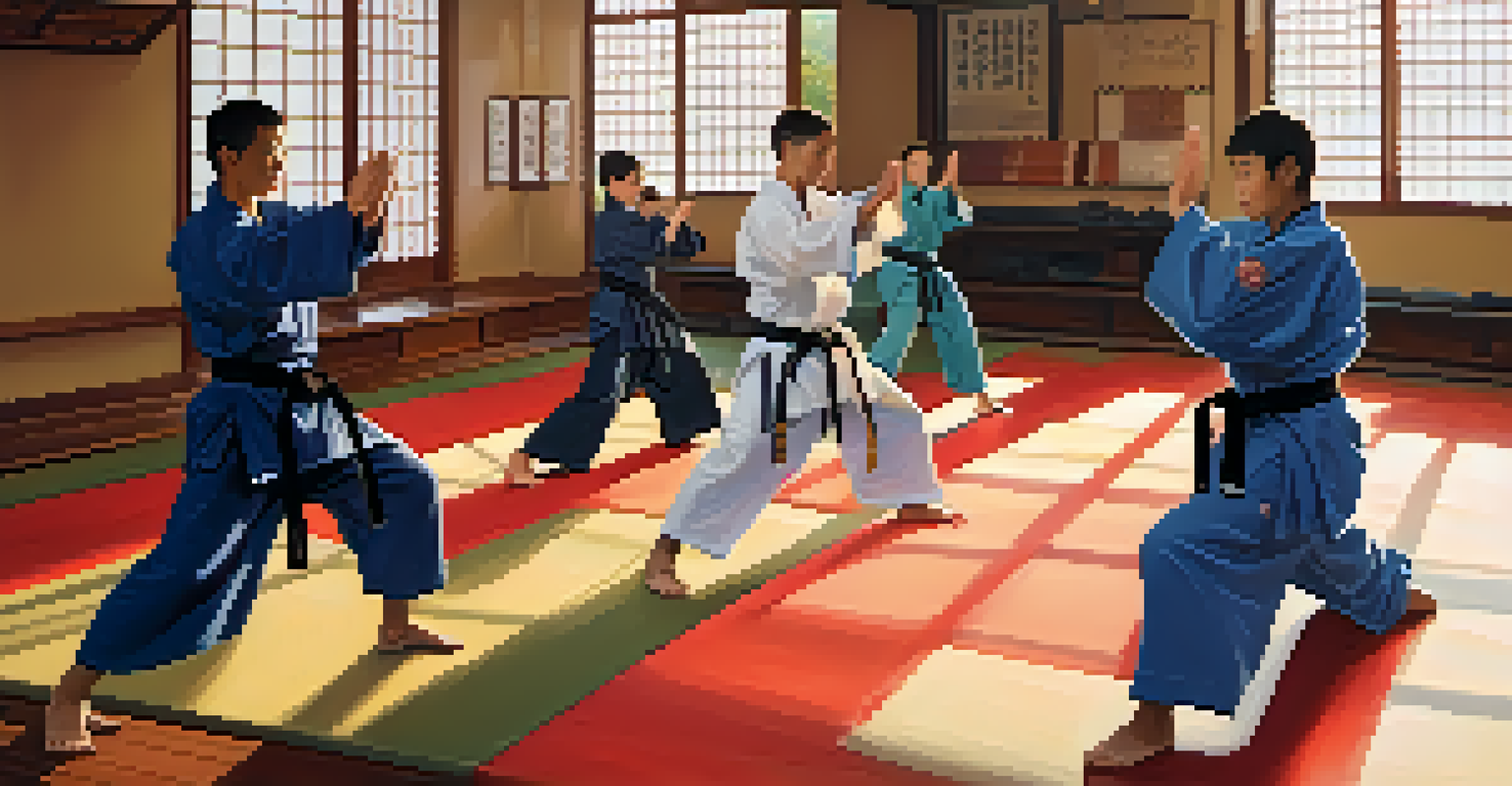The Importance of Respect in Martial Arts and Conflict Resolution

Understanding Respect in Martial Arts Training
Respect is a foundational element in martial arts, guiding practitioners in their training. It’s not just about bowing before entering the dojo; it's about valuing your instructor, peers, and the art itself. This respect fosters a supportive environment where everyone can learn and grow.
Respect is not just a matter of etiquette; it is a matter of character.
When students show respect, they create a culture of encouragement and teamwork. This atmosphere allows for open communication, where questions and feedback can be shared without fear of judgment. As a result, practitioners feel more motivated to improve their skills and push their limits.
Moreover, respecting the martial arts tradition helps preserve the history and techniques passed down through generations. It instills a sense of pride in the practice, reminding students that they are part of something much larger than themselves. This connection to tradition reinforces the importance of respect in every aspect of training.
Respect as a Tool for Conflict Resolution
In both martial arts and everyday life, respect can be a powerful tool for resolving conflicts. When individuals approach disagreements with an attitude of respect, they are more likely to listen and understand each other's perspectives. This openness can diffuse tension and lead to a more constructive dialogue.

For example, in a heated argument, choosing to remain respectful can help prevent escalation. Instead of resorting to aggression, individuals can express their feelings calmly and assertively. This approach not only resolves the conflict but also strengthens relationships by fostering mutual understanding.
Respect as a Training Foundation
Respect is essential in martial arts, fostering a supportive environment for learning and growth among practitioners.
Additionally, practicing respect during conflicts encourages empathy. By putting oneself in another's shoes, individuals can better appreciate different viewpoints. This ability to empathize not only helps in resolving current conflicts but also builds resilience for future disagreements.
The Role of Respect in Building Character
Martial arts training goes beyond physical techniques; it's also about character development. Practicing respect cultivates qualities such as discipline, humility, and integrity. These traits are essential for personal growth and can positively impact all areas of life.
The greatest gift you can give someone is your respect.
For instance, a student who shows respect towards their instructor learns the importance of humility. This understanding can extend beyond the dojo, influencing how they interact with others in their personal and professional lives. Respect helps shape a well-rounded individual who values collaboration and teamwork.
Furthermore, the emphasis on respect fosters a sense of accountability. Practitioners learn that their actions have consequences, both for themselves and others. This awareness encourages them to act thoughtfully, making decisions that reflect their values and respect for those around them.
Respect in Sparring and Competition
In martial arts, sparring and competition are integral parts of training, and respect plays a crucial role in these scenarios. Practitioners must respect their opponents, recognizing their skills and dedication. This respect ensures that sparring sessions are both safe and productive.
When competitors respect one another, they can push each other to perform at their best while minimizing the risk of injury. They understand that the goal is not to dominate but to learn and improve together. This mindset fosters a healthy competitive spirit that benefits everyone involved.
Conflict Resolution through Respect
Approaching disagreements with respect enhances understanding and empathy, leading to more effective conflict resolution.
Moreover, respecting the rules and etiquette of competition reinforces the integrity of the sport. Adhering to established guidelines shows respect for the event organizers and fellow competitors. This commitment to respect enhances the overall experience for everyone, promoting sportsmanship and camaraderie.
The Impact of Respect on a Martial Arts Community
A strong sense of respect within a martial arts community creates a welcoming and supportive environment. When members prioritize respect, they build trust and strong relationships. This bonding fosters a sense of belonging, which is vital for personal and collective growth.
In a respectful community, members are more willing to share knowledge and experiences. This collaborative spirit leads to a richer learning environment, where everyone benefits from each other's insights. As individuals support one another, they contribute to a culture of continuous improvement.
Furthermore, a community rooted in respect can better handle challenges and conflicts. With open lines of communication, members can address issues before they escalate. This proactive approach not only strengthens the community but also enhances the overall experience for everyone involved.
Teaching Respect to Future Generations
One of the most significant responsibilities of martial arts instructors is to instill the value of respect in their students. By modeling respectful behavior, instructors set a precedent for how students should interact with one another. This modeling creates a ripple effect that can influence students both inside and outside the dojo.
Instructors can also incorporate lessons on respect into their curriculum, emphasizing its importance in various contexts. For example, discussing the role of respect during sparring sessions or competitions can help students understand its practical applications. Engaging discussions can reinforce the idea that respect is not just a concept but a way of life.
Building Character through Respect
Practicing respect cultivates important character traits like discipline and integrity, positively impacting all areas of life.
Moreover, involving parents in the conversation about respect can help reinforce these values at home. By aligning expectations between the dojo and the household, students receive a consistent message. This comprehensive approach strengthens the foundation of respect, ensuring that future generations carry this vital lesson with them.
Conclusion: Respect as a Lifelong Value
Respect is more than just a principle in martial arts; it's a lifelong value that transcends the dojo. By integrating respect into training and conflict resolution, practitioners develop skills that benefit them in everyday life. This foundation of respect enhances personal relationships, workplace dynamics, and community interactions.
As students embrace respect, they become ambassadors of positive change. They carry these lessons into their interactions with others, creating a ripple effect that promotes understanding and cooperation. This growth ultimately contributes to a more harmonious society, where respect is valued and practiced.

In essence, the importance of respect in martial arts cannot be overstated. It shapes not only skilled martial artists but also compassionate individuals who understand the power of empathy and collaboration. By prioritizing respect, we not only honor the traditions of martial arts but also enrich our lives and the lives of those around us.